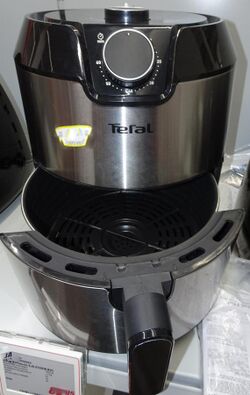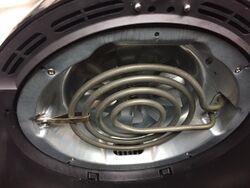Engineering:Air fryer
An air fryer is a small countertop convection oven designed to simulate deep frying without submerging the food in oil.[1][2] A fan circulates hot air[1] at high speed, producing a crisp layer via browning reactions such as the Maillard reaction. Some product reviewers claim that regular convection ovens or convection toaster ovens produce better results[3][4][1] or that air frying is essentially convection baking under a trendy new name.[5]
Cooking
Air fryers use a circulation of hot air to cook food that would otherwise be submerged in oil. The air fryer's cooking chamber radiates heat from a heating element near the food, and a fan circulates hot air.[1] The temperatures can go up to 250 °C (482 °F) depending on the model. Cooking oil is not used in large quantities in an air fryer. Cooking times in the air fryer may be reduced by 20% or more, as compared to non-convection ovens.[citation needed]
Traditional frying methods induce the Maillard effect at temperatures of between 140 to 165 °C (284 to 329 °F) by completely submerging foods in hot oil, well above the boiling point of water. The air fryer works by coating the desired food in a thin layer of oil while circulating air heated up to 200 °C (392 °F) to apply heat and initiate the reaction.[6] As a result, the appliance is able to brown foods like potato chips, chicken, fish, steak, cheeseburgers, french fries or pastries using 70% to 80% less oil than a traditional deep fryer.
Most air fryers have temperature and timer adjustments that allow more precise cooking. Food is typically cooked in a basket that sits on a drip tray. The basket must be periodically agitated, either manually, or by an integrated food agitator.[2] Convection ovens and air fryers are similar in the way they cook food, but air fryers are generally smaller and give off less heat.[2]
The taste and consistency of foods cooked using traditional fried methods compared with air fried techniques are not identical,[1] because the larger quantity of oil used in traditional frying penetrates the foods (or the coating batter, if it is used) and adds its own flavor.
Some air fryers are equipped with additional accessories for specific kinds of cooking, such as pizza pans, skewer racks, grilling trays, and cake barrels.
Like standard convection ovens, air fryers can also roast, steam, and dry food.
History
Convection ovens have been in wide use since 1945.[7]
In 2010, Philips introduced the Airfryer brand of convection oven at a consumer electronics fair in Berlin. It used the patented Rapid Air technology.[8] The term "airfryer" is now often used generically.[9]
Early air fryers were barrel-shaped. More recently, many have come to resemble toaster ovens and pressure cookers, and share their functions.
See also
References
- ↑ 1.0 1.1 1.2 1.3 1.4 "Are air fryers worth it?". Wired. 2018-05-10. https://www.wired.com/story/air-fryers/.
- ↑ 2.0 2.1 2.2 Clark, Melissa (April 1, 2019). "6 Tips for Using Your Air Fryer". The New York Times. https://www.nytimes.com/2019/04/01/dining/air-fryer.html.
- ↑ "Wirecutter's Worst Things for Most People", The Wirecutter, The New York Times November 24, 2020
- ↑ "The Best Air Fryer Is a Convection Toaster Oven", The Wirecutter, The New York Times September 27, 2019
- ↑ "The Best Air Fryer", The Wirecutter, The New York Times updated April 2, 2021
- ↑ McGee, Harold (2004). On Food and Cooking: The Science and Lore of the Kitchen. Scribners. ISBN 978-0684800011. The Maillard Reaction, pp. 778-779; Caramelization, pp. 656-657.
- ↑ "Everything You Need to Know about Convection Ovens & Air Fryers". https://www.air-n-water.com/articles/convection-ovens-air-fryers.htm.
- ↑ "History of the Air Fryer". https://www.exnovate.org/airfryer.
- ↑ "Has airfryer become a generic trademark?". https://www.genericides.org/trademark/airfryer.
Further reading
- Teruel, Maria del Rocio; Gordon, Michael; Linares, Maria Belen et al. (2015). "A comparative study of the characteristics of french fries produced by deep fat frying and air frying". Journal of Food Science 80 (2): 349–E358. doi:10.1111/1750-3841.12753. PMID 25619624. http://centaur.reading.ac.uk/43748/2/Final%20IFT_%20Manuscript%20Revised%20-%20Kn%20edits%202%2011.pdf.
- Yoon, Hei-Ryeo; Bednar, Carolyn; Czajka-Narins, Dorice et al. (1999). "Effect of Preparation Methods on Total Fat Content, Moisture Content, and Sensory Characteristics of Breaded Chicken Nuggets and Beef Steak Fingers". Family and Consumer Sciences Research Journal 28 (1): 18–27. doi:10.1177/1077727X99281002.



